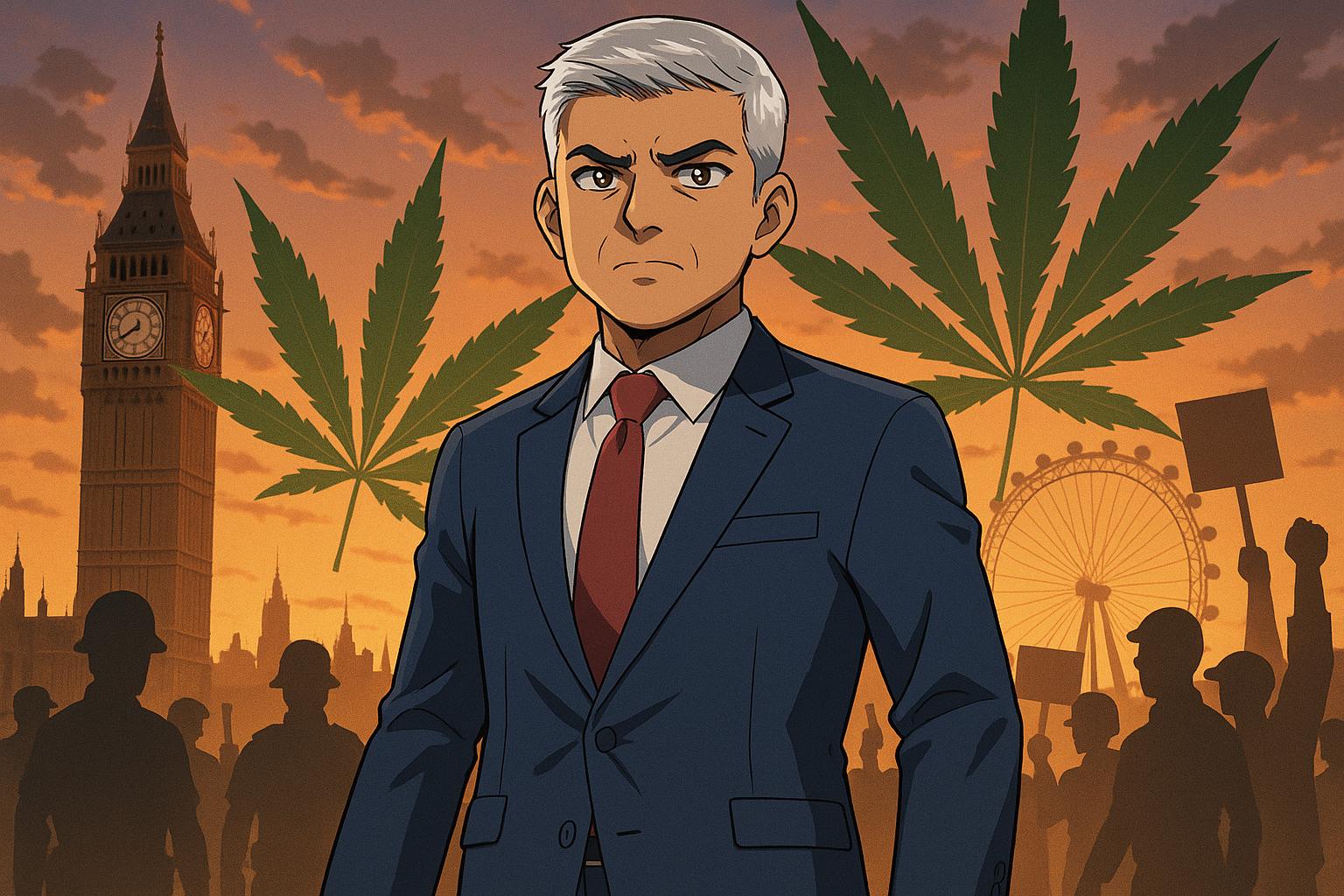Sadiq Khan’s proposal to decriminalise small amounts of natural cannabis provokes sharp criticism from politicians, police leaders and commentators who warn the policy could undermine law enforcement and increase social harms.
The recent announcement from London Mayor Sadiq Khan regarding the decriminalisation of small quantities of natural cannabis has ignited a firestorm of criticism from right-wing commentators, and rightly so. This proposal, framed as a progressive shift towards harm reduction, seems to ignore the alarming social consequences of relaxed drug laws. The underlying report from the London Drugs Commission (LDC) is anything but a sound basis for policy-making; it lacks a comprehensive view of the public safety implications that come with such decisions.
Established under Khan’s direction in 2022, the LDC chaired by Lord Charlie Falconer advocates for changes that could further destabilise law enforcement efforts. By suggesting that enforcement should focus on dealers rather than users, Khan demonstrates a dangerously lenient approach. The proposal’s intent to reclassify cannabis under the Psychoactive Substances Act, while attempting to allow personal possession, raises significant concerns about the message it sends to communities dealing with drug-related challenges.
Critics have been swift to denounce Khan’s initiative. Mercy Muroki from The Sun aptly described the proposal as “lunacy,” exposing the inherent risks tied to cannabis use, particularly its correlation with rising crime rates and health issues. Furthermore, the Daily Mail reported clear discontent from the Metropolitan Police, with Commissioner Mark Rowley affirming strong opposition to Khan’s misguided reformation of drug laws.
The discontent echoed throughout the political landscape, as Labour’s Matthew Pennycook called the proposal unaligned with national policy. Susan Hall, a Conservative member of the London Assembly, condemned the initiative as a “ridiculous” diversion from pressing matters—namely, the need for police funding and crime prevention strategies. These sentiments reflect a broader consensus among those who argue for a tougher stance on drug enforcement.
Indeed, this backlash against Khan is not merely a local issue but part of a larger global dialogue on drug policy. Critics caution against the pitfalls evident in the US and Canada, where relaxed cannabis laws have led to complicated societal challenges. Shadow Home Secretary Chris Philp voices these concerns, framing Khan’s actions as politically correct posturing that neglects the real dangers posed by soft drug policies.
While proponents of decriminalisation cite potential benefits, including generating revenue and undermining the illegal market, the risks cannot be overlooked. The Transform Drug Policy Foundation’s projections of a £1.5 billion revenue stream must be tempered by caution over public safety, especially when historical contexts of law enforcement still resonate in communities today.
Khan’s proposal compels a serious re-evaluation of entrenched views within drug policy discourse. As the rift deepens between progressive narratives and the need for stringent law enforcement, it becomes increasingly evident that innovative drug policies must strike a balance that prioritises public health without compromising safety.
In the aftermath of such proposals, clearly, the need for robust debate on effective drug policy remains pressing. While new perspectives emerge, it is essential to scrutinise their implications on our communities—and ensure that the requirement for safety and order is not sacrificed on the altar of political expediency.
Source: Noah Wire Services
- https://leftfootforward.org/2025/05/right-wing-in-meltdown-over-sadiq-khans-support-of-cannabis-reform/ – Please view link – unable to able to access data
- https://www.theguardian.com/society/2022/may/12/sadiq-khan-launches-commission-to-examine-cannabis-legality – In May 2022, London Mayor Sadiq Khan announced the formation of the London Drugs Commission, chaired by Lord Charlie Falconer QC, to assess the effectiveness of the UK’s drug laws, particularly focusing on cannabis. The commission aims to examine global drug policies and their outcomes, with the goal of providing evidence-based recommendations to tackle drug-related crime, protect public health, and reduce the damage caused by illegal drugs in communities. The initiative reflects Khan’s commitment to exploring new approaches to drug policy in London.
- https://www.theguardian.com/politics/2021/apr/05/mayor-of-london-sadiq-khan-cannabis-legalisation-drugs-commission – In April 2021, Sadiq Khan announced plans to establish an independent London Drugs Commission to examine the potential health, economic, and criminal justice benefits of decriminalising cannabis. The commission would consist of independent experts from various fields, including criminal justice, public health, politics, community relations, and academia. The initiative aims to assess the best methods to prevent drug use, the most effective criminal justice responses, and the public health benefits of different approaches, with a particular focus on cannabis.
- https://www.theguardian.com/society/2022/jan/04/sadiq-khan-plans-pilot-to-decriminalise-minor-cannabis-offences – In January 2022, Sadiq Khan proposed a pilot scheme in three London boroughs to divert young people found with small amounts of cannabis away from arrest and into education or support services. The initiative aims to reduce reoffending and address the disproportionate impact of drug policing on ethnic communities. The pilot is still in development and requires approval from the Mayor’s Office for Policing and Crime. The scheme reflects Khan’s commitment to exploring alternative approaches to drug-related issues in London.
- https://www.theguardian.com/society/2022/may/12/labour-row-decriminalising-cannabis-deepens-sadiq-khan-announces – In May 2022, Sadiq Khan announced the formation of the London Drugs Commission to examine the effectiveness of UK drug laws, particularly focusing on cannabis. The commission aims to assess global drug policies and their outcomes, with the goal of providing evidence-based recommendations to tackle drug-related crime, protect public health, and reduce the damage caused by illegal drugs in communities. The initiative reflects Khan’s commitment to exploring new approaches to drug policy in London.
- https://www.cityam.com/sadiq-khan-eyes-partial-drug-decriminalisation-trial-in-three-london-boroughs/ – In May 2022, Sadiq Khan proposed a pilot scheme in three London boroughs to divert young people found with small amounts of cannabis away from arrest and into education or support services. The initiative aims to reduce reoffending and address the disproportionate impact of drug policing on ethnic communities. The pilot is still in development and requires approval from the Mayor’s Office for Policing and Crime. The scheme reflects Khan’s commitment to exploring alternative approaches to drug-related issues in London.
- https://www.cityam.com/priti-patel-lashes-out-at-sadiq-khan-for-looking-into-legalising-cannabis-better-focus-on-crime-in-london/ – In May 2022, Home Secretary Priti Patel criticised Sadiq Khan’s plan to consider decriminalising cannabis, stating that the Mayor has no powers to legalise drugs and should focus on tackling crime in London. Patel’s comments highlight the ongoing debate over drug policy and the division between local and national government perspectives on the issue. The exchange underscores the complexities involved in addressing drug-related crime and public health concerns in the capital.













